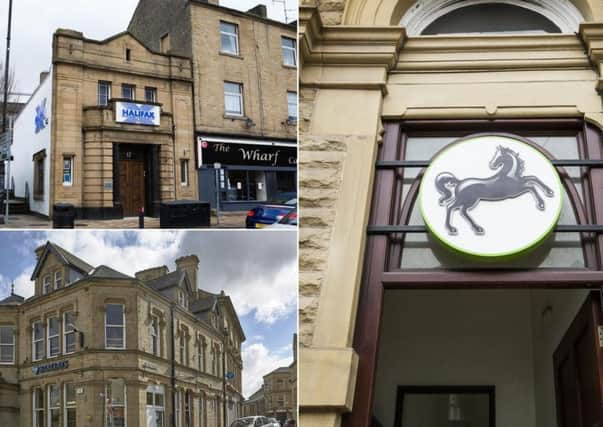Luke Graham: Why banks must be made to pay for branch closures


According to Retail Banker International, the number of bank branches in the UK dropped by 37 per cent between 2007 and 2017. Meanwhile, in 2015, the Campaign for Community Banking Services produced an estimate of the number of “unbanked communities”, which stated that there were 840 communities with only one bank left, and 1,500 communities that had lost all access to their banks.
Advertisement
Hide AdAdvertisement
Hide AdSince 2017, the Royal Bank of Scotland, for example, has announced the closure of 603 branches across the United Kingdom. Scant regard has been given to the impact on rural communities of closing these branches. In my constituency, the elderly are expected to make a 50-plus mile round trip, taking approximately two hours by bus – a journey that will hardly become more bearable as we head into the cold, winter months.


It is also the profile of the closures that grates. As the University of Nottingham identified, the “largest decline in branch numbers are characterised by...the least affluent third of the population bearing the brunt of two-thirds of net closures”.
Meanwhile, despite justifying the closures on the grounds of the movement in consumer behaviour from branch to digital, these retail banks are still opening branches – in the oh-so rural and disconnected wards of Chelsea, Canary Wharf and Clapham, areas with 99 per cent, 96.2 per cent and 99.9 per cent superfast broadband connectivity respectively, versus the 85.5 per cent in my rural constituency. They are serving customers they want, not those who need their services.
Advertisement
Hide AdAdvertisement
Hide AdSo, when the banks refuse to listen to their local customers, I ask the House of Commons to do what it was intended for: to legislate and stand up for their rights.
The Bill I present proposes to do three things. First, it would formalise the access to banking standard, making it a legal requirement for all banks. It would add a requirement for a “rural weighting” to be taken into consideration as part of the impact assessment. These further considerations would be in addition to the criteria, and would take into account local geography and winter weather patterns; local public transport links; and broadband and mobile coverage – all benchmarked against the national average.
Advertisement
Hide AdAdvertisement
Hide AdThe Bill will also make it a requirement, if a bank branch is to be closed early, to state clearly what consultation has taken place with the local Post Office as an alternative provider of banking services. It will also include a requirement for an ATM and a deposit service to be maintained as a basic level of service in a town or village.
Secondly, the Bill will seek to establish a community fund of £100,000 for each branch closure of banks that have had Government funding, or have the Government as a significant shareholder. It is widely recognised that bank branches not only provide vital services to local individuals, businesses and community groups, but often occupy key positions in a town or village, contributing to the vibrancy of the high street and providing an indicator of local economic dynamism.
However, bank branch closures dampen lending growth to small and medium enterprises by an average of 63 per cent in those postcodes that lose a bank branch. The figure grows to 104 per cent in postcode areas that lose their last bank in town, where there is an average of £1.6m less lending as a result of that branch leaving town.
Therefore, £100,000 would not only help address the loss of business, but would go some way in supporting the local community, to be allocated to projects that help boost local high street activity and fund provisions for vulnerable people to access banking services, such as the extension of broadband to rural properties.
Advertisement
Hide AdAdvertisement
Hide AdThirdly, and finally, the Bill will strengthen the provision of Post Office services, which are having to pick up the pieces of the banks’ abandonment of our rural and small communities. Under the Bill, a closing bank must, before leaving a small town or village, detail the alternative banking measures provided and what services will be available through the Post Office.
I am a fervent believer in the market economy, but in a time of great change, Government must ensure that no community is left behind. When banks and institutions have accepted public funding, they must accept that it comes with public responsibilities. We cannot have rural and small communities being abandoned; we cannot have a two-speed United Kingdom.
Luke Graham is the Conservative MP for Ochil and South Perthshire. Edcuated at the University of Sheffield, he has introduced the Banking and Post Office Services (Rural Areas and Small Communities) Bill to Parliament. This is an edited version.